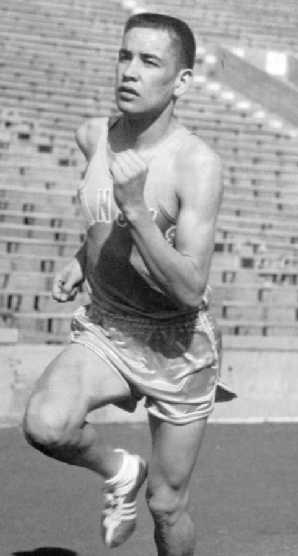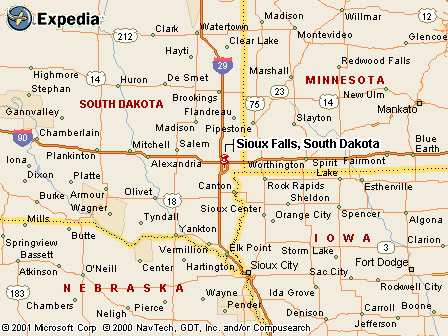|
|
Canku Ota |
|
|
(Many Paths) |
||
|
An Online Newsletter Celebrating Native America |
||
|
November 2, 2002 - Issue 73 |
||
|
|
||
|
Billy Mills' Story Inspires |
||
|
by Kevin Dobbs Argus
Leader
|
 For
Anthony White, a promising cross-country and track runner at Roosevelt
High School, Thursday marked a milestone. For
Anthony White, a promising cross-country and track runner at Roosevelt
High School, Thursday marked a milestone.
He didn't win the biggest race of his 17-year-old life. But he did meet the man who won what is considered among the greatest races in distance-running history. Billy Mills, a Pine Ridge native whose 10,000-meter victory at the 1964 Olympics in Tokyo made him an American hero, gave the keynote address at the Avera Rural Health Conference in Sioux Falls. Among an estimated crowd of 200, White listened to Mills deliver a message of perseverance and triumph. Mills insisted anyone can rise above the harshest of childhoods - even one riddled with poverty and racism. White, who had a chance to meet Mills afterward, left Ramkota Hotel's exhibit hall inspired. "He's an idol for me," said White, a Native American who dreams of big success some day, perhaps as a runner. "It means a lot to me that he was able to go through what he did and become as successful as he has." By most accounts, Mills, now 64, beat the odds. Growing up on Pine Ridge, he came to know some of the poorest living conditions in the United States. Shannon County, home of the Pine Ridge Indian Reservation, is the second-poorest U.S. county, according to the Census Bureau. Unemployment approaches 80 percent. Per capita income is just $6,286. More than half the reservation's adults battle alcoholism, have diabetes or are malnourished. Poor health claimed those closest to Mills. He was 9 when his mother died. Three years later, his father died, leaving Mills orphaned. For all the problems plaguing reservation life, Mills said the most difficult hurdles to clear were the misperceptions fueled by statistics: People assumed he was an alcoholic, even though he does not drink; he couldn't borrow money as a young man because it was assumed he did not work, although he did. "The greatest challenges we face in a changing world are those of perceptions," he said. But Mills said he never quit, never let others' prejudices define him. He studied hard, got into college and became an all-American runner at the University of Kansas. He graduated and became a lieutenant in the U.S. Marines and, later, a world-class runner who won an Olympic gold medal. "If you look deep inside, you're going to find in yourself dignity, character, hope, beauty and dreams," Mills said. But he concedes he was fortunate. He had a passion for sports that helped instill perseverance, a sense of fairness, a drive to succeed - traits he sums up as "life values." Mills told his audience Thursday that communities, especially resource-limited rural towns such as those that dot much of South Dakota, need to embrace and cultivate the diversity in their own and neighboring communities, including reservations. That means bringing together schools, businesses, hospitals, city leaders - the core of small towns - to create programs that support youth and provide opportunities in sports, music, various forms of work or anything with which they can set goals. Such was the focus of this year's rural health conference, which brought together teachers, doctors, agriculture officials and employers to ponder partnerships that could improve schools, add jobs, create programs for kids. Avera Health, which has hospitals and clinics throughout the region, is the leading employer in many small towns. As such, its president and chief executive said the health system should help drive the movement. "We have to find a better way," John Porter said. Otherwise, kids start believing statistics that haunt places such as Pine Ridge, and the vicious cycle of poverty continues, Mills said. Sioux Falls elementary teacher Kathy Famestad echoed that, saying Mills' story is just "the kind of inspiration" educators and others should tout. "What he came from and what he amounted to, it's so impressive," she said. To be sure, Mills' Olympic performance was the defining moment in what he calls "a journey to personal empowerment." But his has been a life filled with successes. He was the subject of the 1983 movie "Running Brave." He is an author and businessman. He has traveled the world several times to tell his story to hundreds of audiences. Mills, who lives in California, also has spearheaded numerous charity events, raising millions of dollars for villages from Africa to Romania. He and his wife, Pat, have three daughters and six grandchildren. Mills said he still runs, though the rounder frame that comes with age has slowed him. The Olympics, he said, were "many, many, many years and about 48 pounds ago."
|
|
|
||
|
|
||
| Canku Ota is a free Newsletter celebrating Native America, its traditions and accomplishments . We do not provide subscriber or visitor names to anyone. Some articles presented in Canku Ota may contain copyright material. We have received appropriate permissions for republishing any articles. Material appearing here is distributed without profit or monetary gain to those who have expressed an interest. This is in accordance with Title 17 U.S.C. section 107. | ||
|
Canku Ota is a copyright © 2000, 2001, 2002 of Vicki Lockard and Paul Barry. |
||
 |
 |
|
|
The "Canku Ota - A Newsletter Celebrating Native America" web site and its design is the |
||
|
Copyright © 1999, 2000, 2001, 2002 of Paul C. Barry. |
||
|
All Rights Reserved. |
||
